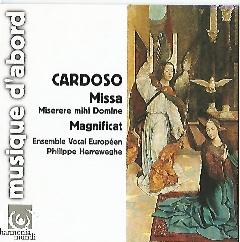Manuel Cardoso - Missa Miserere Mihi Domine – Magnificat (2008)
Manuel Cardoso - Missa Miserere Mihi Domine – Magnificat (2008)

1 Missa Miserere Mihi Domine 1.1 Kyrie 1.2 Gloria 1.3 Credo 1.4 Motet "Sitivit Anima Mea" 1.5 Sanctus. Benedictus 1.6 Motet "Non Mortui Qui Sunt In Inferno" 1.7 Agnus Dei I & II 2 Magnificat Secundi Toni Ensemble Vocal Européen Philippe Herreweghe – conductor
Frei Manuel Cardoso (1566-1650) entered a monastery in Lisbon in 1589 and remained there the rest of his life. This fact has been used partly to explain why his music continues to be clearly Renaissance in style well into the 17th century. However, other Portuguese composers of the period retained a similar style, especially those of the Alentejo School (Cardoso, Lobo, Magalhães).
Cardoso in particular seems to have incorporated some Baroque-style harmonic ideas into a contrapuntal style derived strictly from the Renaissance and Palestrina. His music is perhaps the most sumptuous of the group. --- medieval.org
From 1589 until his death in 1650, Manuel Cardoso spent his life in retreat at a Carmelite monastery during a period when Portugal was subjugated by the Spanish Habsburgs. Thus, the Ensemble Vocal Européen under Philippe Herreweghe focuses on the emotive blend of wounded national pride and social isolation that gives Cardoso’s Renaissance-inspired music its unusually opulent character. Herreweghe shapes the ensemble’s lithe textures with sensitivity and subtlety, highlighting the Missa Miserere mihi domine’s heartfelt entreaties for mercy in the Kyrie, Gloria and Agnus Dei. Perhaps Cardoso was making a veiled plea to the work’s dedicatee, the Duke of Braganza, on whom rested Portugal’s hopes for independence. Whatever the work’s hidden political agenda, this reverberant recording enhances the ensemble’s persuasive emphasis on the hauntingly timeless atmosphere conjured by Cardoso’s rich counterpoint. Two motets illuminate eloquent word-painting, although The Sixteen’s livelier pace and higher pitch in ‘Sitivit anima mea’ generates increased vitality in the rising phrases that symbolise a dove’s wings. With the Miserere mihi domine Mass – interpreted in the context of the composer’s political and social circumstances – Herreweghe and the ensemble show Cardoso’s music in a new light. Their jubilant performance of the Magnificat presents his familiar brilliance. ---Nicholas Rast, classical-music.com
download (mp3 @320 kbs):
yandex 4shared mega mediafire zalivalka cloudmailru uplea ge.tt








